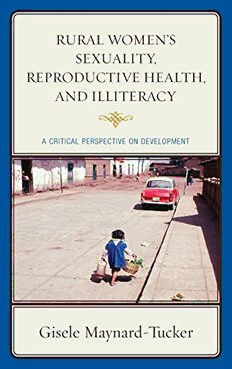
Rural Women's Sexuality, Reproductive Health, and Illiteracy: A Critical Perspective on Development PDF
Preview Rural Women's Sexuality, Reproductive Health, and Illiteracy: A Critical Perspective on Development
Rural Women’s Sexuality, Reproductive Health, and Illiteracy Rural Women’s Sexuality, Reproductive Health, and Illiteracy A Critical Perspective on Development Gisele Maynard-Tucker LEXINGTONBOOKS Lanham•Boulder•NewYork•London PublishedbyLexingtonBooks AnimprintofTheRowman&LittlefieldPublishingGroup,Inc. 4501ForbesBoulevard,Suite200,Lanham,Maryland20706 www.rowman.com UnitA,WhitacreMews,26-34StannaryStreet,LondonSE114AB Copyright©2015byLexingtonBooks Allrightsreserved.Nopartofthisbookmaybereproducedinanyformorbyany electronicormechanicalmeans,includinginformationstorageandretrievalsystems, withoutwrittenpermissionfromthepublisher,exceptbyareviewerwhomayquote passagesinareview. BritishLibraryCataloguinginPublicationInformationAvailable LibraryofCongressCataloging-in-PublicationData Maynard-Tucker,Gisele. Ruralwomen'ssexuality,reproductivehealth,andilliteracy:acriticalperspectiveondevelopment/ GiseleMaynard-Tucker. pagescm Includesbibliographicalreferencesandindex. ISBN978-0-7391-9232-0(cloth:alk.paper)--ISBN978-0-7391-9233-7(electronic) 1.Ruralhealthservices--Developingcountries.2.Women'shealthservices--Developingcountries.3. Ruralwomen--Sexualbehavior--Developingcountries.4.Reproductivehealth--Developingcoun- tries.5.Literacy--Developingcountries.6.Ruralwomen--Servicesfor--Developingcountries.7. Economicdevelopmentprojects--Developingcountries.I.Title. RA771.7.D44M392014 362.1'04257091724--dc23 2014036919 TMThepaperusedinthispublicationmeetstheminimumrequirementsofAmerican NationalStandardforInformationSciencesPermanenceofPaperforPrintedLibrary Materials,ANSI/NISOZ39.48-1992. PrintedintheUnitedStatesofAmerica Contents Preface vii Acknowledgments xi ListofAbbreviations xiii Introduction:MyJourneyacrossCountries xv 1 InternationalDevelopmentandRuralHealth 1 2 Peru:FirstExperienceintheField 11 3 Haiti:TheChallenge 31 4 Africa:Women’sConditions 49 5 IndonesiaandMorocco:BirthingHutsandSelf-Medication 61 6 Madagascar,Senegal,andIndia:SexWork 73 7 NepalandMadagascar:BroadeningtheReachofHealth 91 Conclusion:LessonsLearned? 105 References 113 Index 125 AbouttheAuthor 127 v Preface I started being interested in anthropology while I studied for my bachelor’s degree at the University of California, Los Angeles (UCLA). I was an adult woman, marriedwith ayoungson, whenI decidedto gobackto schooland earnanacademicdegree.AftergraduatingwithaPh.D.inanthropologyfrom UCLA, I worked for many years as a freelance international consultant in various developing countries, Africa, Latin America, the Caribbean, Asia, andIndia.Mybackgroundinanthropologyhelpedmeunderstandthevarious cultures, and I was able to immerse myself in ethnic beliefs, customs, and practices.Italsohelpedmetonavigatebetweenthepoliciesoftheministries of health, the administrating agencies, and nongovernmental organizations (NGOs). I acquired expertise in my field evaluating various programs, amongthemfamilyplanning,reproductivehealth,maternalandchildhealth, and HIV/AIDS prevention. The reason I decided to write this book is to illustrate the years spent in the field dealing with various health topics in- volvingruralwomen. I alsowantto sharemy experiences with students andthoseinterestedin development work. In order to do so, I describe the challenges of being an anthropologist living in foreign countries and dealing with ethnic customs, genderinequality,andtheneedforadaptiontoimprobablesituations.Iillus- trate the problems working for international and national organizations that werenotalwaysinharmonywiththeirbureaucracy,policies,andsustainabil- ityprocedures. Whileevaluatingtheprograms in thehealthfacilities of theministries of health in various countries, I always had to visit the rural communities that were the most challenging for the delivery of the programs. I became inter- ested in rural communities, and my interest in rural women came from the time I spent living with the Quechua Indian women in Peru. I realized that vii viii Preface illiteracy was a major handicap for them, along with their lack of power to decide about their reproductive outcomes. In the book, I want to bring to light the numerous challenges rural women face when dealing with health, illiteracy, gender inequality, and cultural beliefs, and I describe their ap- proach to modern medicine and their enduring use of traditional medicine andhealers. The book illustrates rural women living in different ethnic societies and provides insights into health-care delivery in rural parts of the world. It reveals the intimate life of the women who are subject to gender inequality, subserviencetotheirpartners,andtheirneedtoconformtoculturalcustoms. In many cultures girls are not the valued gender and are dependent on their malepartners or ontheirkin foreconomicsurvival unless theyare educated or have mastered a skill. I write about their approaches to modern medicine andtheirpragmatic solutionsto resolvetheirhealthproblems based ontheir financialmeansandculturalbeliefs.Traditionalmedicineisverymuchalive in rural communities because of traditional beliefs and the lack of health facilities, transportation, and cash. Healers and traditional midwives are the health-carealternativestophysiciansandtrainedmidwives.Thehighmater- nal mortality in most developing countries attests to this problem, which is known by international donors, ministries of health, and local NGOs but remainsunsolved. I also discuss my findings about women involved in sex work in Mada- gascar,Senegal,andIndiainordertoshowthatwomenwhoareilliterateand havenoskillshavenoalternative but to selltheirbodiesin orderto survive. Clandestine sex work isawayforpoor womento makefastmoneyin order totakecareoftheirchildrenandtobeindependentfromapartner.However, it is risky because of the HIV epidemic and also because of violence from clients. Women’sstatusandconditionsarerelatedtotheireducation.InMorocco, there are educated modern women who are ministers in the government’s offices, and there are women who live in the countryside and are veiled, wearing the burqa, and follow the cultural customs of subservience to their husbands. The latter are illiterate and have no skills. Women’s status will remain unchangeduntil girls are educatedandlearn aprofessionalskill,and until themothers will changethegirls’ enculturationprocess; that is, raising girls not as theirimagebut very muchlike theyraiseboys, independentand assured.Girlsshouldbeliberatedfromculturaloppressionthroughthesame enculturationastheirmalecounterparts. The book gives an inside look at the health systems in the rural areas of Peru, Africa, the Caribbean, and Asia. Everywhere, ministries of health de- pend on international funding to improve their national programs, but be- cause of corruption and the constant migration of the trained medical staff, theoutputsoftheministriesareverylimited.Ontheotherhand,international Preface ix organizations do not supervise or monitor the improvement of their projects through surveys of beneficiaries’ opinions of the quality of care of the ser- vices. There is a big gap between programmatic improvement that is the focusoftheorganizationsandthesatisfactionofthebeneficiaries. Finally,Ihopethatthebookwillenlightenthereadersaboutthereachof globalization in traditional societies, and the ways of life of rural women in various cultures, their plight for survival, and their strategies when dealing with their sexuality and health problems. I try to show that illiteracy affects women’s health behavior, and their comprehension of modern drugs and medical explanations. It is a barrier to modern medicine and health-care deliveryinthecontextofinternationaldevelopment. For me, this work is a testimony of my involvement in years of research andevaluations.Iwrotethebookforstudentsinterestedinanthropologyand other humanity sciences, and I also hope to reach policy makers and the broader international community who are supporting women’s progress in developing countries. The book suggests a change of perspective within the developmentcommunityfromasinglefocusonwomen’shealthtoabroader perspectiveencompassinglinkagestoliteracy,microcredit,andcommunica- tion.
